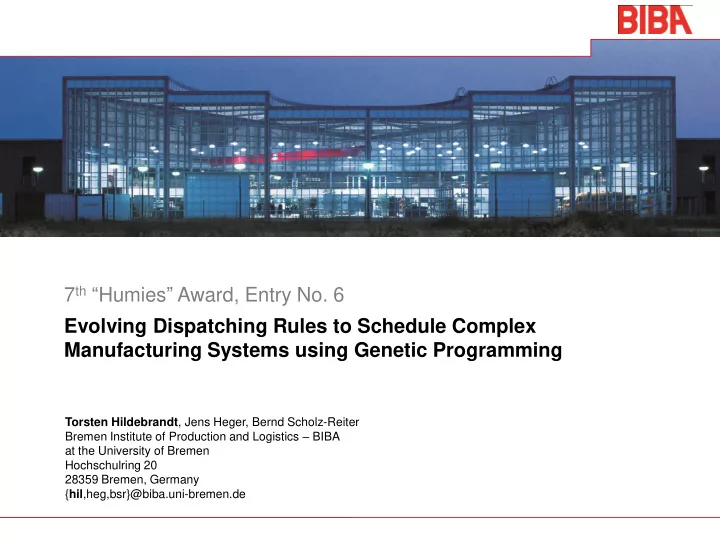

7 th “ Humies ” Award, Entry No. 6 Evolving Dispatching Rules to Schedule Complex Manufacturing Systems using Genetic Programming Torsten Hildebrandt , Jens Heger, Bernd Scholz-Reiter Bremen Institute of Production and Logistics – BIBA at the University of Bremen Hochschulring 20 28359 Bremen, Germany { hil ,heg,bsr}@biba.uni-bremen.de
Citation Torsten Hildebrandt, Jens Heger und Bernd Scholz-Reiter: Towards Improved Dispatching Rules for Complex Shop Floor Scenarios — a Genetic Programming Approach In: Proceedings of the 2010 Genetic and Evolutionary Computation Conference (GECCO), Portland, USA, 2010. (accepted paper, to appear) detailed presentation: Sunday 11 th , 14:00; Combinatorial Optimization and Metaheuristics track; room: Meadowlark Portland, 2010-07-09 GECCO Humies Award Entry 6: Dispatching Rules Torsten Hildebrandt 2
Problem Description dynamic, stochastic job shop scheduling thoroughly researched job shop scenarios by Holthaus and Rajendran 1999 10 machines, 2500 jobs job arrival, processing times, machine order are stochastic processes dispatching rules as a scheduling heuristic M1 whenever a machines becomes idle choose waiting job with highest priority to process next M2 easy to understand and implement … computationally very efficient, real-time M3 scheduling heuristics satisfactory results buffer job source machine Portland, 2010-07-09 GECCO Humies Award Entry 6: Dispatching Rules Torsten Hildebrandt 3
Solution Approach GP used as a hyper-heuristic, i.e. the solution is a dispatching heuristic simulation-based optimization of dispatching rules with expensive fitness evaluations length of a simulation run random influences require multiple replications GP implementation of ECJ (http://cs.gmu.edu/~eclab/projects/ecj/) coupled with our own implementation of an efficient discrete-event simulation transparent utilization of multi-core/multi-processor machines Portland, 2010-07-09 GECCO Humies Award Entry 6: Dispatching Rules Torsten Hildebrandt 4
Human Competitiveness (1/2) (G) The result solves a problem of indisputable difficulty in its field. dynamic job shop scheduling is np-complete scheduling very important in practice, subject to decades of research finding dispatching rules tedious, largely manual task requiring substantial experience and technical skills Portland, 2010-07-09 GECCO Humies Award Entry 6: Dispatching Rules Torsten Hildebrandt 5
Human Competitiveness (2/2) (B) The result is equal to or better than a result that was accepted as a new scientific result at the time when it was published in a peer-reviewed scientific journal. (E) The result is equal to or better than the most recent human-created solution to a long-standing problem for which there has been a succession of increasingly better human-created solutions. (F) The result is equal to or better than a result that was considered an achievement in its field at the time it was first discovered. C. Rajendran and O. Holthaus. A comparative study of dispatching rules in dynamic flowshops and jobshops. In: European Journal of Operational Research, 116(1):156-170, July 1999 O. Holthaus and C. Rajendran. Efficient jobshop dispatching rules: further developments. In: Production Planning & Control, 11(2):171-178, 2000. Our results: their best rule improved mean flowtime by 6.3% over SPT (Shortest Processing Time first) we could reduce mean flowtime over their best rule by another 8.5% (14.3% if compared with SPT) rules found are robust Portland, 2010-07-09 GECCO Humies Award Entry 6: Dispatching Rules Torsten Hildebrandt 6
Why should we win the prize? problem solved is of high practical importance GP can help to capture the true potential of dispatching rule-based scheduling routinely create not just human-comparable but even better-than-human machine solutions GP used as a hyper-heuristic is a valuable tool for scheduling researchers and practitioners to evolve real-time scheduling heuristics GP-evolved antenna (2004 award winner): GP-evolved dispatching rule: ≙ ? 2004 award winners Lohn, Hornby, Linden Portland, 2010-07-09 GECCO Humies Award Entry 6: Dispatching Rules Torsten Hildebrandt 7
Thank you! Torsten Hildebrandt, Jens Heger und Bernd Scholz-Reiter: Towards Improved Dispatching Rules for Complex Shop Floor Scenarios — a Genetic Programming Approach In: Proceedings of the 2010 Genetic and Evolutionary Computation Conference (GECCO), Portland, USA, 2010. (accepted paper, to appear) detailed presentation: Sunday 11 th , 14:00; Combinatorial Optimization and Metaheuristics track; room Meadowlark Bremen, 05.07.2010 BIBA - Bremer Institut für Produktion und Logistik GmbH at the University of Bremen 8
Recommend
More recommend